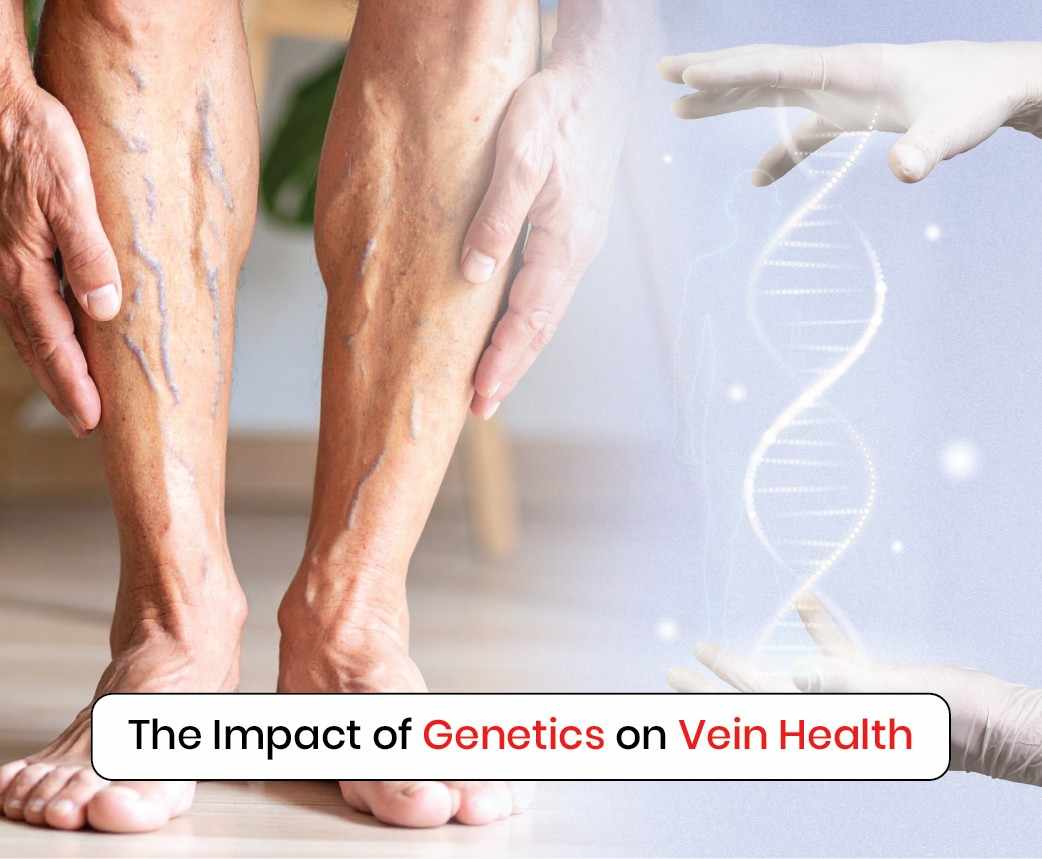Vein health is a critical component of overall cardiovascular wellness, yet it’s often overlooked until problems arise. One significant factor influencing vein health is genetics. Understanding how hereditary factors contribute to vein conditions can help in managing and preventing issues like varicose veins and chronic venous insufficiency (CVI). This blog explores the hereditary aspects of vein health and highlights minimally invasive treatments like sclerotherapy, ClariVein® (mechanochemical ablation), and glue therapy as effective, non-surgical options.
Genetics and Vein Health
- Hereditary Risk Factors
Genetics play a crucial role in determining vein health. If you have a family history of vein conditions, you are more likely to develop similar issues. Studies suggest that up to 90% of individuals with varicose veins have a family member who also has them. Genetic factors can affect the strength and structure of vein walls and valves, making them more susceptible to malfunction.
- Gender and Hormones
Gender also intersects with genetic predispositions. Women are more prone to vein problems than men, partly due to hormonal influences. Hormones such as estrogen and progesterone, which fluctuate during pregnancy, menstrual cycles, and menopause, can weaken vein walls. This hereditary sensitivity to hormonal changes increases the risk for conditions like varicose veins.
- Lifestyle and Environment
While genetics play a significant role, lifestyle factors influenced by family habits also impact vein health. Sedentary lifestyles, prolonged standing or sitting, and obesity can exacerbate hereditary predispositions. Therefore, a combination of genetic and environmental factors often determines the extent of vein issues.
Minimally Invasive Treatment Options
Fortunately, advancements in medical technology have provided several minimally invasive treatment options that offer effective relief without the need for traditional surgery.
- Sclerotherapy
Sclerotherapy involves injecting a sclerosant solution directly into the affected veins, causing them to collapse and eventually be reabsorbed by the body. This treatment is highly effective for small to medium-sized varicose veins and spider veins. The procedure is quick, typically performed in an outpatient setting, and requires minimal downtime, making it an excellent option for those with busy lifestyles.
- Glue Therapy
Medical Glue therapy, involves the injection of a medical adhesive into the vein. This adhesive seals the vein shut, rerouting blood flow to healthier veins. Glue therapy is particularly advantageous because it eliminates the need for multiple injections and compression stockings post-treatment. The procedure is quick, virtually painless, and allows for immediate return to daily activities.
- Cryo-Laser and Cryo-Sclerotherapy (CLaCS)
Cryo-Laser and Cryo-Sclerotherapy, known as CLaCS, is an innovative treatment combining laser therapy and sclerotherapy with the application of intense cold. During CLaCS, a laser targets and treats the veins, followed by sclerotherapy injections. The simultaneous use of a cooling device minimizes discomfort and enhances results. This approach is particularly effective for treating spider veins and small varicose veins, offering the benefits of both laser therapy and sclerotherapy with improved patient comfort and faster recovery
Benefits of Minimally Invasive Treatments
Reduced Recovery Time: Minimally invasive treatments require little to no downtime, allowing patients to resume their normal activities quickly.
Minimal Pain and Discomfort: These procedures are generally less painful than traditional surgery, with local anesthesia typically being sufficient.
Lower Risk of Complications: Non-surgical treatments carry fewer risks of complications such as infection and scarring.
Effective Outcomes: Many patients experience significant relief from symptoms and improved vein appearance after these treatments.
While hereditary factors play a significant role, lifestyle choices and minimally invasive treatments like sclerotherapy, and glue therapy offer effective solutions. These treatments provide excellent outcomes with minimal disruption to daily life, making them ideal choices for those seeking to manage vein health without surgery. If you have a family history of vein issues or are experiencing symptoms, consult a vein specialist to discuss the best treatment options for you.

